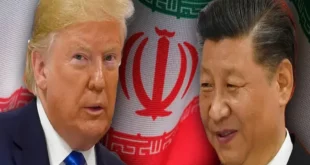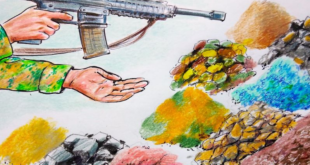Pakistani Prime Minister Imran Khan on Wednesday denounced as “idiocy” his country’s past policy of becoming a “front-line state” in the U.S.-led war against terrorism in Afghanistan, blaming the policy for the persistent security and economic challenges facing Islamabad.
“We can be, and will always remain, partners in peace with America. We can never be partners in conflict anymore,” Khan told Parliament in a statement.
Khan again ruled out the possibility of providing Pakistani bases to the U.S. military for counterterrorism strikes in Afghanistan following the planned withdrawal of U.S. troops from the neighboring country after nearly two decades.
The prime minister recounted that Pakistan’s decision to join the U.S. war triggered a militant backlash in his country in which 70,000 Pakistanis were killed in suicide bombings and other terror attacks, and losses of around $150 billion were inflicted on the fragile national economy.
Instead of appreciating the sacrifices, Khan lamented, Washington called Islamabad a “hypocrite” and questioned Pakistan’s integrity.
Pakistan’s historically roller-coaster relations with the U.S. have remained under scrutiny since U.S.-led foreign forces invaded Afghanistan almost 20 years ago.
The punitive military action ousted the Islamist Taliban from power in Kabul for harboring al-Qaida leaders, whom Washington says planned the September 11, 2001, terror attacks on U.S. cities that killed around 3,000 people.
Support for Taliban alleged
Washington has consistently complained that despite receiving billions of dollars in U.S. assistance to facilitate the military mission in Afghanistan, the Pakistani spy agency covertly supported and provided sanctuary to the Taliban.
The support is believed to have enabled the Taliban to organize a deadly insurgency against coalition forces in Afghanistan and regain control over swaths of Afghan territory, effectively stalemating the war. Pakistan consistently denied providing military or any other support for the Taliban.
U.S. drones also routinely struck suspected militant targets on the Pakistani side of the long, porous Afghan border, attacks that allegedly had the tacit approval of the then-government in Islamabad.
Washington has lately praised Pakistan for facilitating its peace talks with the Taliban. The dialogue culminated in the February 2020 landmark deal that paved the way for all U.S. and coalition troops to leave Afghanistan and close the longest war in American history.
The military drawdown formally began on May 1 and is expected to largely conclude in the coming weeks, well ahead of the September 11 deadline set by U.S. President Joe Biden.
In exchange, the Taliban halted attacks on international forces and began peace talks with representatives of the U.S.-backed Afghan government. But the negotiations, being hosted by Qatar, have since stalled, with Afghan adversaries blaming each other for the deadlock.
Speaking Wednesday, Khan criticized Biden’s unexpectedly fast-paced troop withdrawal and its request that Pakistan use its leverage to push the Taliban to the negotiating table to find a political settlement to the war.
The prime minister said Islamabad had been urging the Taliban to desist from a military takeover of Afghanistan and cautioning them that such a move would only prolong the civil war and cause more devastation.
Pressure on families?
Khan explained the only leverage his country could use with the Taliban is that their families reside in Pakistan.
“Should their families be arrested and imprisoned? What else [does the U.S.] expect … Pakistan to do?” he asked.
Khan also suggested Pakistan lost that leverage once the U.S. announced the date of its withdrawal from Afghanistan.
Analysts, and even members of the U.S. Congress, have also been critical of Biden’s troop-exit decision, saying it has emboldened the Taliban to intensify their battlefield attacks and bring more Afghan territory under their control within the past two months.
Pakistani Interior Minister Sheikh Rashid also told a local television network earlier this week that families of the Afghan Taliban live in the suburbs of Islamabad, the national capital. He added that “sometimes, dead bodies of the Taliban arrive in Pakistan, while wounded insurgents also are brought for treatment in local hospitals.”
CIA Director William J. Burns visited Islamabad unannounced in April to discuss possible cooperation with Pakistani counterparts on how to mitigate the terrorism threat from Afghanistan if the country plunges into another civil war after the U.S. troop withdrawal.
When asked last week by the U.S. news website Axios if Pakistan would provide military bases for Washington to conduct strikes inside Afghanistan, Khan said, “Absolutely not.”
There was no immediate U.S. response to Khan’s declaration.
Pakistani supply and communication lines have played a crucial role in sustaining and sending supplies to international forces in landlocked Afghanistan for the past two decades.
The two countries share a nearly 2,600-kilometer open border. Pakistani officials say a massive unilateral construction effort has largely fenced off the frontier in recent years, effectively deterring militant infiltration in either direction.
 Eurasia Press & News
Eurasia Press & News



